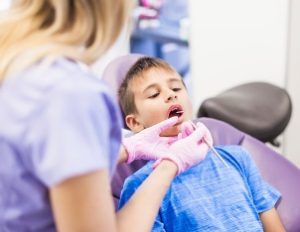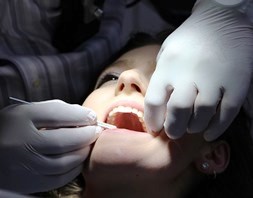Dental Hygiene Schools
How to Enroll In the Best One Near Saint Paul Minnesota
 Picking the right dental hygienist college near Saint Paul MN is an essential initial step toward launching your new career in dentistry. But before you can make your selection, you need to analyze and compare your school options. There is much more to completing your due diligence than choosing the school with the most affordable tuition or enrolling in the college that is closest to your residence. There are other crucial issues to take into account also, such as the school's reputation and accreditation. Dental hygienists typically earn an Associate Degree, as compared to a certificate usually earned by assistants, and can take anywhere from two to three years to finish. Naturally with the longer training of a hygienist comes more cost. We will discuss all of these concerns and additional questions that you should be asking the dental hygienist schools you are reviewing later in this article. But first, let's review the roles of dental hygienists and the training programs offered.
Picking the right dental hygienist college near Saint Paul MN is an essential initial step toward launching your new career in dentistry. But before you can make your selection, you need to analyze and compare your school options. There is much more to completing your due diligence than choosing the school with the most affordable tuition or enrolling in the college that is closest to your residence. There are other crucial issues to take into account also, such as the school's reputation and accreditation. Dental hygienists typically earn an Associate Degree, as compared to a certificate usually earned by assistants, and can take anywhere from two to three years to finish. Naturally with the longer training of a hygienist comes more cost. We will discuss all of these concerns and additional questions that you should be asking the dental hygienist schools you are reviewing later in this article. But first, let's review the roles of dental hygienists and the training programs offered.
It Takes Just a Few Minutes to Start Your Dental Hygienist Career Below
Dental Hygienist Job Duties

When contrasting the job of a dental hygienist to that of an assistant, the most significant difference is undoubtedly that the hygienist works more independently. Dental assistants work with and in support of the Saint Paul MN dentists and the practice. Hygienists, while also assisting the practice, work with the patients more on a one-to-one basis. They are typically the initial person a patient interacts with when called from the waiting room. They examine each patient's teeth and gums and report their findings to the dentists. They also may carry out basic procedures. Based on state law, a hygienist's responsibilities may include:
- Removing plaque, tartar and stains
- Applying fluoride treatments
- Polishing teeth and applying sealants
- Teaching patients regarding oral care
- Taking and developing X-rays
- Removing sutures and applying fillings
Dental Hygienist Degree Options
Due to the increased responsibility in contrast to an assistant, dental hygienists working in Saint Paul MN dental offices are usually required to have an Associate Degree in dental hygiene rather than a certificate. These programs can take anywhere from 2 to as long as 3 years to finish and must be accredited by the CDA in nearly every state. They are offered in community colleges as well as trade and technical schools. And in addition to classroom studies learning the fundamentals of dental hygiene, there will be a clinical component to the training as well. Some programs also offer internships with local dentists or dental practices.Dental Hygienist Online Classes
 Choosing an online dental hygienist college may be a viable option for getting your training. Just remember that the program will not be totally online, since there will be a clinical portion to your training. But the balance of your classes will be provided by means of your desktop computer in the comfort of your Saint Paul MN home or elsewhere on your laptop or tablet. For those continuing to work while attending college, online dental classes make education a lot more accessible. Some may even charge lower tuition fees than their traditional competitors. And added expenses for items like commuting, books and school supplies may be reduced also. The clinical training can typically be completed at an area dental office or in an on-campus lab. With both the online and clinical training, everything required to get the appropriate education is provided. If you have the discipline for this mode of education, you might find that attending an online dental hygienist school is the ideal option for you.
Choosing an online dental hygienist college may be a viable option for getting your training. Just remember that the program will not be totally online, since there will be a clinical portion to your training. But the balance of your classes will be provided by means of your desktop computer in the comfort of your Saint Paul MN home or elsewhere on your laptop or tablet. For those continuing to work while attending college, online dental classes make education a lot more accessible. Some may even charge lower tuition fees than their traditional competitors. And added expenses for items like commuting, books and school supplies may be reduced also. The clinical training can typically be completed at an area dental office or in an on-campus lab. With both the online and clinical training, everything required to get the appropriate education is provided. If you have the discipline for this mode of education, you might find that attending an online dental hygienist school is the ideal option for you.
Subjects to Ask Dental Hygienist Colleges
Now that you have decided to become a dental hygienist in Saint Paul MN, you can begin the process of comparing schools and programs. As we covered at the opening of this article, a number of prospective students start by checking out the location and the cost of the colleges. Possibly they look for some online alternatives as well. Even though these may be relevant initial considerations, there are several additional questions that you need to address to the colleges you are reviewing in order to reach an informed decision. Toward that end, we have furnished a list of questions to assist you with your evaluation and ultimate selection of the ideal dental hygienist program for you.
Is the Dental College Accredited? There are a number of important reasons why you should only select an accredited dental hygienist college. If you are going to become certified or licensed, then accreditation is a prerequisite in nearly all states. To qualify to take the National Board Dental Hygiene Exam, your dental program must be accredited by the Commission on Dental Accreditation (CDA). Accreditation also helps guarantee that the instruction you get is of the highest quality and comprehensive. Saint Paul MN employers often desire or require that new hires are graduates of accredited colleges. And last, if you are applying for financial aid or a student loan, frequently they are not obtainable for non-accredited schools.
Is Adequate Practical Training Included? Clinical or practical training is a vital part of any dental training program. This holds true for the online school options also. A number of dental hygienist programs have associations with local dental practices and clinics that furnish clinical training for their students. It's not only essential that the program you choose provides adequate clinical hours but also provides them in the kind of practice that you ultimately would like to work in. For example, if you have an interest in a career in pediatric dentistry, check that the program you enroll in offers clinical rotation in a local Saint Paul MN dental practice that focuses on dental treatment for children.
Is There an Internship Program? Ask if the dental schools you are considering have an internship program. Internships are undoubtedly the most effective way to get hands-on, clinical experience in a real dental practice. They make it easier for students to transition from the theoretical to the practical. They can also help students form professional relationships in the Saint Paul MN dentistry community. And they are attractive on resumes too.
Is Job Placement Support Offered? Most students that have graduated from dental hygienist schools require help landing their first job. Ask if the colleges you are researching have job assistance programs, and what their job placement rates are. Programs with higher job placement rates are likely to have good reputations within the Saint Paul MN dental profession in addition to large networks of contacts where they can position their students for employment or internships.
Are the Classrooms Smaller? Find out from the colleges you are evaluating how big on average their classes are. The smaller classes tend to offer a more personal setting for learning where students have greater access to the teachers. On the other hand, large classes tend to be impersonal and offer little one-on-one instruction. If feasible, ask if you can attend a few classes at the Saint Paul MN dental hygienist college that you are most interested in so that you can experience first hand the amount of interaction between students and teachers before enrolling.
What is the Total Cost of the Program? Dental hygiene schools can differ in cost based on the duration of the program and the amount of clinical training provided. Other variables, for instance the reputations of the schools and whether they are public or private also have an impact. But besides the tuition there are other substantial costs which can add up. They can include expenses for such things as commuting and textbooks as well as school equipment, materials and supplies. So when comparing the cost of schools, remember to include all of the costs related to your education. The majority of colleges have financial aid departments, so make sure to ask what is offered as far as grants, loans and scholarships in the Saint Paul MN area.
Are the Classes Convenient? Before enrolling in a dental hygienist college, you must verify that the hygienist or assistant program offers classes that accommodate your schedule. This is particularly true if you will be working while receiving your education and have to attend classes near Saint Paul MN in the evenings or on weekends. And even if you choose an online school, you will still be required to schedule your practical training classes. Also, while addressing your concerns, ask what the make-up policy is if you should have to miss any classes due to work, illness or family issues.
Find Out More About Training to Become a Dental Hygienist in Saint Paul
Pick the Best Saint Paul Dental Hygienist School
Picking the right dental hygienist course is crucial if you wish to take the National Board Dental Hygiene exam or, if required in your state, become licensed. As you now know, there are a number of alternatives offered to acquire your education and it takes a relatively short period of time to become a dental hygienist. You can receive your formal training through dental hygienist programs at junior colleges, technical institutes, trade schools and vocational schools. Graduates of these schools usually receive an Associate Degree. Dental Hygienists typically require about two years of studies prior to entering the job market. When pursuing a degree you can elect to attend classes online or on-campus. Whichever mode of training you decide to pursue, by addressing the questions presented in this article you will be better prepared to make the appropriate choice. And by doing so, you will be ready to begin your journey toward becoming a dental hygienist in Saint Paul Minnesota.
Saint Paul Dental Hygiene Schools | Saint Paul Dental Hygienist Programs Near Me
